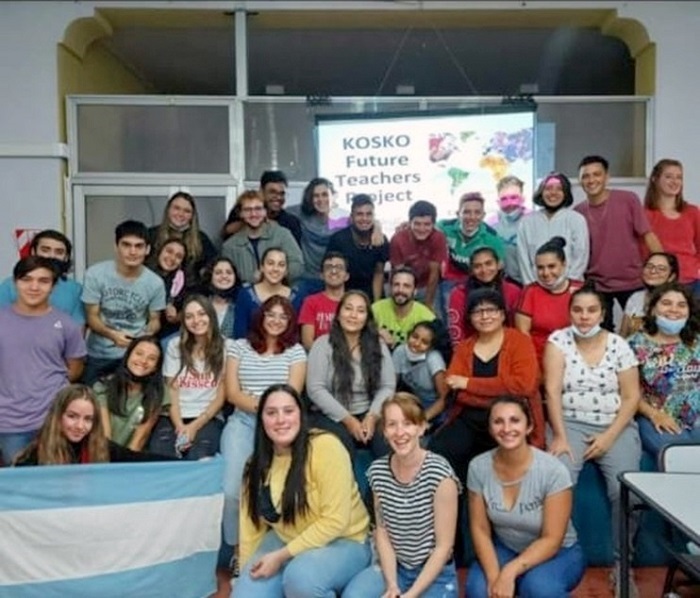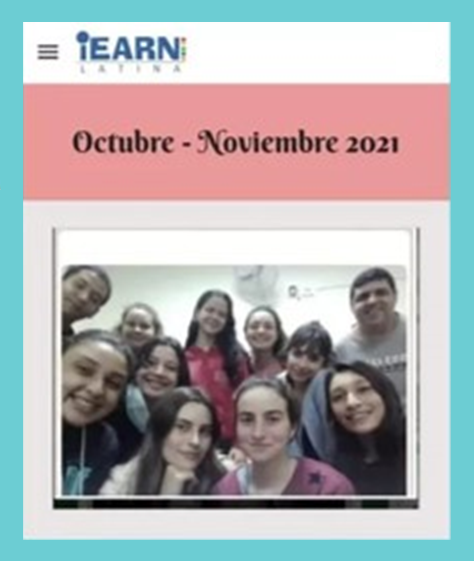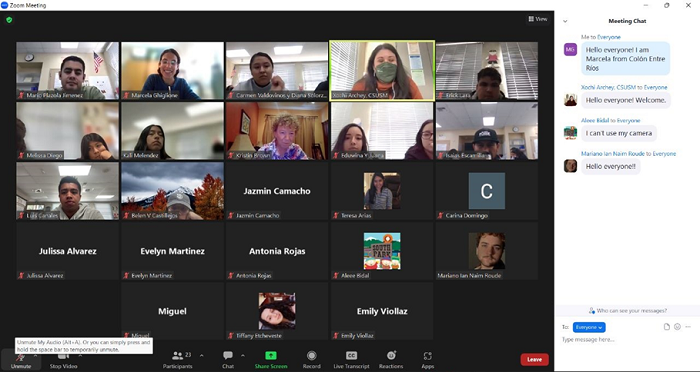 |
| Article Series |
| "Real Voices 2023" No.8 Argentina |
|
|
|
|
| Connecting the World! Teachers' Network News |
| Real Voices of iEARN Teachers Around the World |
The year 2023 marks the 20th anniversary of JEARN established as an official NPO in Japan.
To celebrate this memorial year, JEARN launched a monthly interview series "Real Voices" to deliver
the real voices of iEARN teachers from around the world. Each article introduces
school systems of each country and region, daily efforts of teachers and
staff, and the development of students for global competence and citizenship.
|
|
|
|

Students engaging in an iEARN Project:
iEARN Project: KOSKO (Knowing Our Students, Knowing Ourselves). We met and worked with students
from Taiwan and Brazil. (Knowing Our Students, Knowing Ourselves). We met and worked with students
from Taiwan and Brazil.
|
|
Marcela Paula Ghiglione
iEARN Teacher
Escuela Normal Superior ROU, Argentina
|
Ms. Marcela
Paula Ghiglione
from Argentina
|
| What school or organization are you working at? If you are a teacher, how many years of experience do you have as a teacher? |
I have been an EFL teacher for 16 years. At the moment I am teaching English
Language I and II, English Grammar I, Methodology I and II, Linguistics
and Comparative Languages. I have been teaching Literature since 2014.
I have been teaching in the four years of the program.
My school is called Escuela Normal Superior ROU. It is located in Colón,
Entre Ríos, Argentina. I work at the EFL Teacher Training College which
is a program that lasts four years and once students finish it they receive
their degree as English teachers. They are able to teach from kindergarten
to secondary school. There are almost 38 subjects in this program, some
of them are in Spanish and based on Pedagogy and Psychology. The rest are
English subjects. In each year there are almost 12 students. My city is
small and it is touristic. The school is public.
|
| What is the compulsory
education system in your country? At
what age does compulsory education start and end?
|
The formal education system in
Argentina is structured into four levels: kindergarten education, primary
education, secondary education, and tertiary education (this one is not compulsory).
Education is free at all levels, starting from the age of four. There are also
private schools in each province. Argentina consists of 23 provinces and the
Autonomous City of Buenos Aires.
Kindergarten programs in Argentina focus on fostering children's development
through play-based learning, creative activities, and social interaction.
The curriculum in kindergarten includes activities that promote language
and communication skills, pre-mathematical concepts, fine and gross motor
skills, social-emotional development, and basic knowledge about the environment.
They generally attend school for three hours.
Primary education in Argentina lasts six years, from ages 6 to 11. The
primary school curriculum includes subjects such as mathematics, language
and literature, natural sciences, social sciences, physical education,
arts, and foreign languages (usually English). Students receive a well-rounded
education during this period, focusing on developing basic literacy, numeracy,
and critical thinking skills. Generally, they attend school around five
hours per day from Monday to Friday. There are schools that are known as
NINA and students can eat there too and they have different workshops during
the afternoon.
Secondary education in Argentina typically lasts for six or seven years
and is divided into two cycles: the basic cycle (Ciclo Básico) and the
orientated cycle (Ciclo Orientado). The basic cycle, which lasts for three
years, provides a general education to students and covers various subjects
such as mathematics, language and literature, natural sciences, social
sciences, physical education, and foreign languages. At the end of the
basic cycle, students may choose to continue their education in the orientated
cycle. Technical schools last seven years.
Tertiary education in Argentina
consists of universities and non-university higher education institutions.
Universities offer a wide range of academic programs, including undergraduate,
graduate, and doctoral degrees. Non-university higher education institutions,
known as tertiary institutes or institutes of higher education, offer technical
and professional courses that focus on practical skills and vocational
training. My school is a non-university program.
The academic year generally starts the
first days of March and ends on the 23rd December. Winter holidays take place
in the month of July (fifteen days). The dates depend on each province.
|
| How many years of experience do you have in iEARN? What iEARN projects
have you done with your students? |

Students engaging in an iEARN Project:
Affective Dictionary  : We met and worked : We met and worked
with students from Dominican Republica. |
I have worked with iEARN since 2021.
I participated in two projects: Affective Dictionary and KOSKO. I loved both projects because we worked with the 17SDGs and creative writing. My students that were studying to become English teachers met students from Taiwan, the USA, and Brazil. We used Zoom for the intercultural exchanges.
|
| Has the COVID-19 pandemic affected your school or your students?
Were there any major changes?
|
| I
have seen the following changes: increased reliance on technology; flexible
schedules and personalized learning; flipped methodology; new ways of assessing
students based on more integral and holistic perspectives.
|
| How is technology used in class? What digital devices do your
students use in class or at home? What are some challenges or advantages of
using technology in school? |
Generally,
my students use the mobile phone in class and at home they usually have computers
that are shared by all members of their family.
Personally,
I love technology as I see it as an intercultural bridge that allows my
students to be connected worldwide. As I work with young adults and adults
technology can be a big challenge but they are eager to learn and foster their
skills. |
The use of technology in teaching and learning offers several significant
advantages: access to information and resources, interactivity, collaborative
learning, inclusivity, different rhythm of learning. |

Working with students from the USA
online. |
|
Internet
connection is a problem in most of the Argentinian schools. Nevertheless, there
are national programs that contribute to its accessibility for examples
"Conectar Igualdad".
It
is observed that generally there are few free courses based on digital skills
applied to the field of foreign languages.
|
| Could you give any messages to teachers in Japan? |
| I
am passionate about teaching and learning. When you create rapport with your
students, everything is possible to achieve, even beyond technical or
structural problems. It is extremely important to work cooperatively. Thank you
for this opportunity. |
 About the projects About the projects
 KOSKO : My students are from first and fourth year of the English Teacher Training
College from “Escuela Normal Superior Republicap Oriental del Uruguay”
(Colón, Entre Ríos, Argentina) in the subject Language I worked cooperatively
with students from the USA, Taiwan and Brazil through the project nd Brazil through the project KOSKO (Knowing Our Students, Knowing Ourselves) held by iEARN (International Education and Resource Network) in the years 2022 and 2023. Students were invited to fulfill different tasks such as the creation of digital books, collaborative digital murals based on the 17 SDGs, creative poems, Flip videos. These intercultural experiences were really powerful. KOSKO : My students are from first and fourth year of the English Teacher Training
College from “Escuela Normal Superior Republicap Oriental del Uruguay”
(Colón, Entre Ríos, Argentina) in the subject Language I worked cooperatively
with students from the USA, Taiwan and Brazil through the project nd Brazil through the project KOSKO (Knowing Our Students, Knowing Ourselves) held by iEARN (International Education and Resource Network) in the years 2022 and 2023. Students were invited to fulfill different tasks such as the creation of digital books, collaborative digital murals based on the 17 SDGs, creative poems, Flip videos. These intercultural experiences were really powerful.
 Affective Dictionary : The iEARN project Affective Dictionary invites students to connect the
curricular themes to the objectives, select words to define from their
own point of view, draw up a wall using Padlet and interact with their
peers in the forum. Nevertheless, the amazing side of this experience was
that they fulfilled those aims and, at the same time, they fostered their
intercultural competence by being part of a virtual exchange with students
from Dominican Republic interchanging and building up knowledge together.
In the students’ words, “at the beginning, we learnt about the seventeen
sustainable development goals which were really interesting and we realised
that there are a lot of people worrying about the planet out there and
it is our task to take action”, “the project presented by our teacher as
well as facilitators left us with a lot of new knowledge and cultural issues
that we did not know before the experience”. Over the time we absorbed
some new words, fresh vocabulary and developed our creativity. The fact
that we participated made us get to know each other better as a group and
if I had the chance to choose to participate again Affective Dictionary : The iEARN project Affective Dictionary invites students to connect the
curricular themes to the objectives, select words to define from their
own point of view, draw up a wall using Padlet and interact with their
peers in the forum. Nevertheless, the amazing side of this experience was
that they fulfilled those aims and, at the same time, they fostered their
intercultural competence by being part of a virtual exchange with students
from Dominican Republic interchanging and building up knowledge together.
In the students’ words, “at the beginning, we learnt about the seventeen
sustainable development goals which were really interesting and we realised
that there are a lot of people worrying about the planet out there and
it is our task to take action”, “the project presented by our teacher as
well as facilitators left us with a lot of new knowledge and cultural issues
that we did not know before the experience”. Over the time we absorbed
some new words, fresh vocabulary and developed our creativity. The fact
that we participated made us get to know each other better as a group and
if I had the chance to choose to participate again |
|
*****
The iEARN Teacher interviews are part of a series of articles by JEARN
entitled "Connecting The World! Teachers Network News" starting
with the January 2023 issue in a Japanese monthly magazine for educators, Cresco
(Otsuki Shoten Publishers here). |
|

|